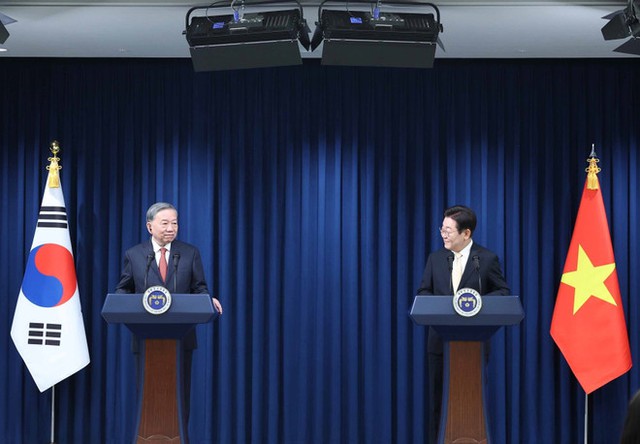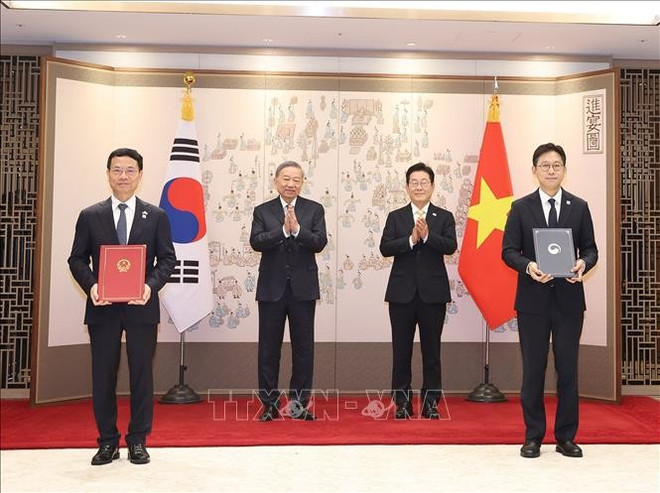Viet Nam, South Korea issue Joint Statement on deepening Comprehensive Strategic Partnership
VGP - Viet Nam and South Korea have issued a Joint Statement on further deepening the bilateral Comprehensive Strategic Partnership on the occasion the State visit to South Korea by General Secretary To Lam from August 10-13.

General Secretary To Lam and President Lee Jae Myung co-chair the press briefing to announce the outcomes of their summit meeting in Seoul, August 11, 2025.
According to the Joint Statement, General Secretary To Lam and President Lee Jae Myung appreciated the remarkable development of bilateral relations since the establishment of diplomatic ties in 1992, especially after the elevation to a Comprehensive Strategic Partnership in 2022.
They affirmed that the two countries are each other’s leading and important partners across all fields.
The two leaders agreed that the achievements over the past three decades provide a solid foundation and lasting momentum for both sides to strengthen and deepen the Comprehensive Strategic Partnership in a more substantive and effective manner, and to elevate it to a new stage.
They agreed to further deepen cooperation in all areas to ensure tangible benefits for the people of both countries and contribute to peace, stability, and development in the region and the world.
The two sides consented to step up high-level exchanges in multiple formats, from bilateral visits and meetings at international forums to multilateral conferences, virtual talks, phone calls, and written correspondence. They reached a consensus on strengthening cooperation across Party, Government, National Assembly, ministerial, and locality-to-locality channels and among citizens from walks of life.
They underscored the need to promptly update each other on the implementation of cooperation documents signed between high-ranking leaders, including the Action Programme to realise the Viet Nam-South Korea Comprehensive Strategic Partnership.
In national defence-security, the two countries will develop substantive cooperation through expanded ministerial talks, deputy-minister-level strategic defence and security dialogues, and police conferences. They vowed to increase delegation exchanges and expand cooperation in maritime security and training, with the resumption of the Joint Committee on defence industry and logistics, push for collaboration in defence technology, defence industry, and security industry through concrete projects, and closer links between defence enterprises.
They also promised to bolster collaboration on demining operations, the United Nations peacekeeping, information sharing on strategic issues of shared concern, and tackling non-traditional security threats and transnational crime, while coordinating more closely on consular and judicial matters, including cases involving detained nationals.
On the economic front, the two countries reaffirmed their goal of raising two-way trade to US$150 billion by 2030 in a balanced and sustainable manner. They will promote long-term, strategic cooperation not only in trade, investment, industry, energy, and technology but also in supply chains, while expanding mechanisms such as the Viet Nam–Korea Deputy Prime Minister-level Economic Dialogue, the Inter-Governmental Committee, the Joint Committee on trade, industry, and energy cooperation, and the Joint Committee for implementing the Viet Nam–Korea Free Trade Agreement (VKFTA). The two sides also pledged to work closely within regional and multilateral economic frameworks, including the ASEAN–Korea Free Trade Agreement (AKFTA), the Regional Comprehensive Economic Partnership (RCEP), and the Indo-Pacific Economic Framework for Prosperity (IPEF).
Both sides will actively encourage Korean firms to invest or expand in Vietnam, with priority given to hi-tech industrial parks, digital industries such as AI and semiconductors, infrastructure, renewable energy, smart cities, and global value chains. The Korean side asked for Viet Nam’s support for Korean companies to engage in infrastructure projects, while Viet Nam reiterated its commitment to an open, transparent, and stable investment environment for foreign enterprises, including those from South Korea. The host expressed interest in having capable Korean firms join Viet Nam's strategic infrastructure projects in the fields of nuclear power, renewable energy, electricity grids, and high-speed rail.
The two sides commended the positive outcomes achieved through cooperation between their financial and monetary authorities, agreeing to work toward developing a shared database system for Viet Nam’s insurance sector to establish a transparent and sustainable insurance market. They also shared that it is necessary to set up relevant cooperation mechanisms to discuss and comprehensively implement knowledge-sharing projects in the financial sector that have been implemented such as the successful operation of Viet Nam’s stock market and the bilateral retail payment connectivity through QR codes between the two countries.
Science, technology, innovation, and digital transformation were identified as priority areas, with plans for joint research, training, and exchanges in AI, semiconductors, biotechnology, materials, and energy, and closer ties between innovation and startup ecosystems.
They concurred to expand cooperation in the domains of renewable energy and improve energy efficiency, while strengthening information exchange in oil and gas exploration and extraction. They also agreed to expand cooperation in the digital transformation of the energy industry and cybersecurity. The two countries will share information and experience in nuclear power development and encourage substantive cooperation between enterprises in this field. Other areas of enhanced collaboration include gas-fired power, fuel conversion in coal-fired thermal power plants, energy transition, application of hydrogen and green ammoniac co-firing in thermal power plants, power grid expansion, and smart grid development. The two sides agreed to study cooperation possibilities between governments and businesses in utilising critical minerals and strengthening investment promotion to build critical mineral supply chains.
Both sides affirmed their determination to continue implementing bilateral cooperation in development cooperation based on agreements such as the Framework Agreement on the Economic Development Cooperation Fund (EDCF) and the Economic Development Partnership Fund (EDPF) Cooperation Agreement, each worth US$2 billion until 2030. Viet Nam appreciated South Korea's implementation of the official development assistance projects in areas where Viet Nam has demands and requested the country to continue supporting large-scale projects such as energy transition, environment, healthcare, green infrastructure, and transportation. Additionally, both sides agreed to continue close cooperation to ensure rapid and smooth implementation of development cooperation projects.
Promoting labour, healthcare, education cooperation on par with comprehensive strategic partnership

General Secretary To Lam and South Korean President Lee Jae Myung witness the exchange of a Memorandum of Understanding on sci-tech cooperation in Seoul, South Korea, August 11, 2025
Both sides agreed to exchange policies and sign a Memoranda of Understanding in public personnel management, contributing to improving public administration in both countries and enhancing citizens’ interests and rights. They appreciated the expansion of the MoU under the Korean Employment Permit System. Viet Nam pledged to simplify work permits for Korean citizens while the Korean side said it may expand industries accepting Vietnamese workers. Besides, Viet Nam requested South Korea's support for its workers returning home after their contracts end so that they can continue working for Korean businesses in their homeland.
Healthcare cooperation will focus on technology transfer, biotechnology research for vaccines and medical products, genetic technology, AI applications, and telemedicine. Both countries will share information regarding pharmaceutical management regulations and promote exchanges between medical institutions and universities.
Meanwhile, education initiatives include increased scholarships for Vietnamese students, particularly in AI and STEM fields, digital transformation programmes, and compilation of Korean language textbooks for Vietnam's curriculum. Both sides will expand university partnerships.
Strengthening cooperation in sustainable development, climate change response, agriculture, infrastructure
The two sides agreed to fully implement bilateral cooperation on climate change by holding the second meeting of the joint working group implementing the framework agreement for climate change cooperation as well as exchanging policies and technologies for greenhouse gas emission reduction and climate change adaptation, and carbon credit exchanges to achieve carbon neutrality by 2050. Close collaboration will be carried out in the Reduced emissions from deforestation and forest degradation (REDD+) project, forest preservation projects, water resources management, and environmental protection initiatives like waste-to-energy plants and recycling zones.
In the meantime, agricultural cooperation emphasises high-tech and smart farming to reduce emissions, with technology sharing across production, processing, and distribution of food products where both countries have advantages.
Viet Nam and South Korea agreed to continue implementing existing cooperation in areas of mutual interest, including transport infrastructure development, urban planning and development, housing, real estate, technical infrastructure, industrial parks and smart cities.
The Korean side agreed to continue sharing its experience in policy-making and state management tools in fields where it has strengths, such as the development and operation of transport infrastructure through short- and long-term training courses, conferences, forums, and regular meetings; as well as to support human resources training in the transport and construction sectors, contributing to advancing the bilateral Comprehensive Strategic Partnership.
Regarding cultural, sports, tourism, people-to-people exchanges, the two sides agreed to boost cooperation in exchanges and activities promoting culture, sports and tourism, and to organise cultural events such as exhibitions, performances, cultural days, and cultural weeks in each other’s territories.
Both sides highly valued the positive contributions of the Korean community in Viet Namand the Vietnamese community in South Korea to bilateral relations and agreed to facilitate the integration of multicultural families into local life and ensure stable residence and improved welfare for the two countries' citizens.
They consented to effectively implement the annual “Meet Korea” programme, jointly organised by Viet Nam’s Ministry of Foreign Affairs, the Korean Embassy in Viet Nam, and Vietnamese localities, to promote exchanges between businesses and people of both countries.
The two sides agreed to strengthen cooperation and mutual support at international and regional organisations and forums, including the United Nations (UN), the World Trade Organisation (WTO), the Asia-Pacific Economic Cooperation (APEC), the Partnership for Green Growth and the Global Goals 2030 (P4G) Summit, and the Organisation for Economic Co-operation and Development (OECD). Viet Nam appreciated South Korea's support for it to successfully host the P4G Summit 2025 and fulfil its role as Co-chair of the OECD Southeast Asia Regional Programme (SEARP) for the 2022–2025 term. Both sides also agreed to work closely to ensure the successful organisation of the APEC Economic Leaders’ Meetings to in South Korea in 2025 and in Viet Nam in 2027.
They reaffirmed their commitment to enhancing cooperation within ASEAN and Mekong sub-regional mechanisms, such as ASEAN–South Korea, Mekong–South Korea, ASEAN+3, the East Asia Summit (EAS), the ASEAN Regional Forum (ARF), and the ASEAN Defence Ministers’ Meeting Plus (ADMM+). Viet Nam expressed its readiness to work closely with South Korea to effectively and substantively implement the ASEAN–Korea Comprehensive Strategic Partnership framework. They stressed the importance of resuming the Mekong–South Korea Summit at an appropriate time to realise the vision of building a people-centred community for peace and prosperity in the region.
Both sides affirmed their willingness to actively engage in joint international efforts to address traditional and non-traditional security issues and global challenges such as marine environmental protection, climate change response, energy security, food security, and economic security.
They consented to step up close coordination and mutual support between their legislatures at regional and global inter-parliamentary forums, such as the Inter-Parliamentary Union (IPU), the Asia-Pacific Parliamentary Forum (APPF), and the ASEAN Inter-Parliamentary Assembly (AIPA).
Both sides reaffirmed the importance of ensuring peace, stability, respect for international law, and freedom of navigation and overflight in the East Sea, especially the principle of peacefully solving disputes based on international law, particularly the 1982 United Nations Convention on the Law of the Sea (UNCLOS 1982). They also emphasised the need for the full and effective implementation of the Declaration on the Conduct of Parties in the East Sea (DOC) and for the early finalisation of a substantive and effective Code of Conduct in the East Sea (COC) in accordance with international law, especially UNCLOS.
Viet Nam welcomed and expressed support for the Korean Government’s efforts to resume inter-Korean dialogue and cooperation, and showed its readiness to actively contribute to creating an environment of peace, stability, and prosperity on the Korean Peninsula.
The two sides shared the view that the State visit to South Korea by Vietnamese General Secretary To Lam and his spouse was a great success, marking a significant milestone and opening a new chapter in the Viet Nam – South Korea Comprehensive Strategic Partnership./.

